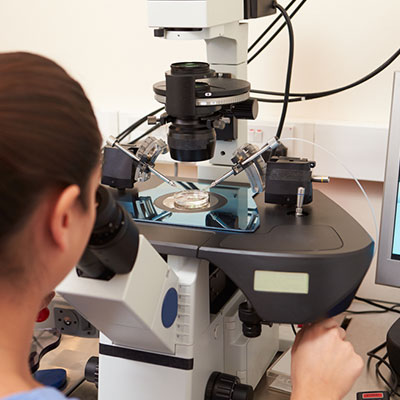PGT-A, or Preimplantation Genetic Testing for Aneuploidy, is a genetic test performed on embryos created through in vitro fertilization (IVF). Its purpose is to identify aneuploidy, which refers to an abnormal number of chromosomes. Aneuploidy is a leading cause of miscarriage, implantation failure, and the birth of a child with a chromosomal disorder like Down syndrome. During PGT-A, a small biopsy is taken from the embryo, and the cells are analyzed for chromosomal abnormalities. Embryos identified as euploid (having the correct number of chromosomes) are then preferentially transferred to the uterus, aiming to improve IVF success rates and reduce the risk of chromosomal abnormalities in the pregnancy. While PGT-A can be a valuable tool for some patients, it's important to discuss its potential benefits and limitations with a fertility specialist for Female Infertility Treatment in Karimnagar .
Why PGT – A
Preimplantation Genetic Testing for Aneuploidy (PGT-A) is a powerful tool used in In Vitro Fertilization (IVF) to screen embryos for chromosomal abnormalities. Its primary use is to identify embryos with the correct number of chromosomes (euploid) and differentiate them from those with an abnormal number (aneuploid). This allows for the selective transfer of euploid embryos, which significantly increases the chances of a successful pregnancy and reduces the risk of miscarriage. PGT-A is particularly beneficial for patients with recurrent pregnancy loss, advanced maternal age, or previous failed IVF cycles. By transferring chromosomally normal embryos, PGT-A helps to improve IVF outcomes and reduce the time to pregnancy by Female Infertility doctors in Karimnagar, Dr. Nayani Enjamoori

What is PGT-SR
Preimplantation genetic testing in Karimnagar also includes Preimplantation Genetic Testing for Structural Rearrangements (PGT-SR), a specialized genetic test used during in vitro fertilization (IVF) to identify embryos that have inherited chromosomal structural rearrangements from a parent. These rearrangements, such as translocations and inversions, can lead to an increased risk of miscarriage, stillbirth, or the birth of a child with a genetic disorder. PGT-SR helps intended parents who are known carriers of such rearrangements to increase their chances of a successful pregnancy and a healthy baby by selecting and transferring only embryos with a normal chromosomal complement. This reduces the likelihood of implanting an affected embryo, thereby decreasing the risk of pregnancy loss and the birth of a child with a chromosomal abnormality. It's a valuable tool for families facing the challenges associated with inherited structural chromosomal changes.
Why PGT-SR
PGT-SR, or Preimplantation Genetic Testing for Structural Rearrangements, is a valuable tool for individuals or couples who carry chromosomal rearrangements, such as translocations or inversions. These rearrangements can lead to the creation of unbalanced chromosomes in their eggs or sperm, which in turn can result in recurrent miscarriages, failed IVF cycles, or the birth of a child with significant health problems. PGT-SR is performed during an IVF cycle, where embryos are created and then biopsied. The biopsy by Female Infertility Specialists in Karimnagar allows for the genetic testing of each embryo to identify those that are chromosomally balanced and thus have a higher likelihood of resulting in a healthy pregnancy and live birth. By transferring only the balanced embryos, PGT-SR significantly reduces the risk of miscarriage and genetic disorders associated with the specific rearrangement, offering hope and a clearer path to parenthood for those affected.
